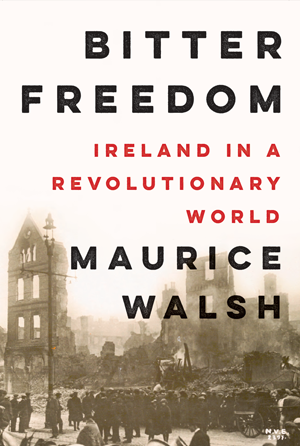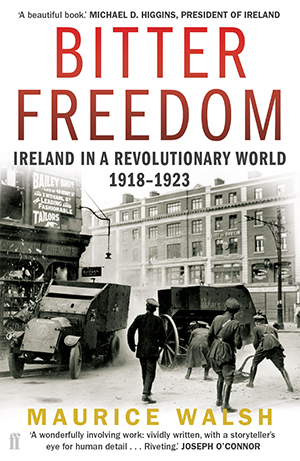  |

 Buy it now
Buy it now
|
 Buy it now
Buy it now
|
Bitter Freedom is a new history of the Irish Revolution, placing the war between the British authorities and the newly-formed IRA in the global disorder born of the terrible slaughter of the First World War, as well providing a kaleidoscopic portrait of the human face of the conflict. It was the first successful revolt against the British Empire. But it was not alone. Nationalist movements across the world were fired by the American promise of self-determination.
For too long, the story of Irish independence and its aftermath has been told within an Anglo-Irish context; Bitter Freedom shows how Ireland was part of a civilisation in turmoil. A national revolution which captured worldwide attention from India to Argentina was itself profoundly shaped by international events, political, economic and cultural. In the era of Bolshevism and jazz, developments in Europe and America had a profound effect on Ireland, influencing the attitudes and expectations of combatants and civilians.
The hopes, dreams and bitter disappointments of the revolutionary years affected everyone in Ireland whether they fought or not. Bitter Freedom also brings to life the experiences of Irish people removed from the fighting - the plays they went to, the exciting films they watched in the new cinemas and the books they read. But the price of freedom was partition, a devastating civil war and the daunting challenge of establishing a new nation in an uncertain world...
The book was cited by Michael D Higgins, the Irish President in a 2016 speech.
Listen to a podcast of a discussion about Ireland at the Irish Embassy:
https://www.dfa.ie/irish-embassy/great-britain/news-and-events/2015/irish-embassy-london-podcasts/#
Listen to a panel discussion I took part in organised by History Ireland in Dublin:
“Eye-opening. . . . Walsh’s narrative is really about the toughness of the Irish people, the enormous role of the Catholic Church, the end of the landed gentry, and how the Irish Republican Army led what the author calls a flawed revolution. . . . An excellent history, but more importantly, a sharply written portrait of a people and their long struggle to survive.”
Kirkus Reviews, starred review
"A masterful description of both the gritty detail and grand picture of the struggle all at once"
Bitter Freedom is a wonderfully involving work: vividly written, with a storyteller's eye for human detail and a scholar's sense of broader and deeper movements over time.
Joseph O'Connor, novelist
“Sets Ireland’s post-1916 history in its global and human context, to brilliant effect.”
Neil Hegarty, The Irish Times “Books of the Year 2015”
Maurice Walsh's invigorating account of the revolution and its immediate aftermath starts after the Rising, and firmly locates the Irish crisis in the postwar Europe described by Thomas Masaryk as 'a laboratory atop a vast graveyard'. Vivid and incisive, his approach highlights discontinuities and contradictions among the revolutionaries.
Roy Foster, Carroll Professor of Irish History, Oxford University in The Spectator
“Probably the best overview of the revolutionary era . . .superbly crafted and a joy to read. It is particuarly suited to an international audience wishing to know more about the Irish revolution but provides many for thos of us who think we are fairly familiar with the subject.”
Padraig Yeates, History Ireland
What sets apart Maurice Walsh's hugely readable new book is that he places the political upheaval. . .within a broader European context, so we view the Irish revolution not as a stand-alone event, but as part of a wave of change that was sweeping across Europe.
Dermot Bolger Sunday Business Post
The great strength of this compelling book is that it manages to make large and abstract arguments while conveying a sense of the lived experience of the Irish revolution. With one hand, Maurice Walsh widens his lens, while simultaneously he applies a magnifying glass with the other. The result of this dexterity is an arresting set of Big Pictures interspersed with a sequence of vivid miniatures. Indeed, the particular originality of the work lies in the striking conjunction of images.
Alvin Jackson, Richard Lodge Professor of History, Univesity of Edinburgh in The Tablet
“A vivid narrative with a reporter’s ear and eye for a telling anecdote or revealing vignette. He offers . . . a chilling impression of how law and order broke down. Walsh moves beyond ingrained Irish exceptionalism to set the story in an international context.”
David Reynolds, Professor of International History, Cambridge University in the New Statesman
Maurice Walsh is a gifted writer with a novelist's eye for the illuminating detail of everyday lives in extremis ... The great strength of Walsh's book is its breadth of vision.
Feargal Keane Prospect
Maurice Walsh’s point of departure is . . .to show that Ireland was “part of a civilisation in turmoil.” In this task he succeeds admirably. This is partly because his story begins not with yet another wearisome iteration of the opera-stage rebellion of 1916 that never had the remotest chance of success but in 1918, with the turmoil that beset so many of the European polities in the immediate aftermath of the Great War."
Ronan Fanning, Dublin Review of Books.
“What’s different about this book is it puts [the Irish revolution] in a world context. You’ll adore it . . . it’s very well written.”
Mary O' Rourke, former Irish Minister for Education on The Pat Kenny Show, Newstalk
“A vivid and highly engaging account of events in Ireland during the most turbulent and transformative period in the history of the United Kingdom.”
History Today
Maurice Walsh's book is the most vivid and dramatic account of this epoch to date: if you want to feel the full horror of Bloody Sunday in Dublin and the 'sacking' of Balbriggan by the Black and Tans, this is the place to look.
Paul Bew, Professor of Politics, Queens University Belfast in Literary Review
‘This thoughtful book is particularly good on the forces that led people in different directions. Did this country actually need to resort to war to achieve national freedom?’
All paintings by Phil Kelly, click here to find out more